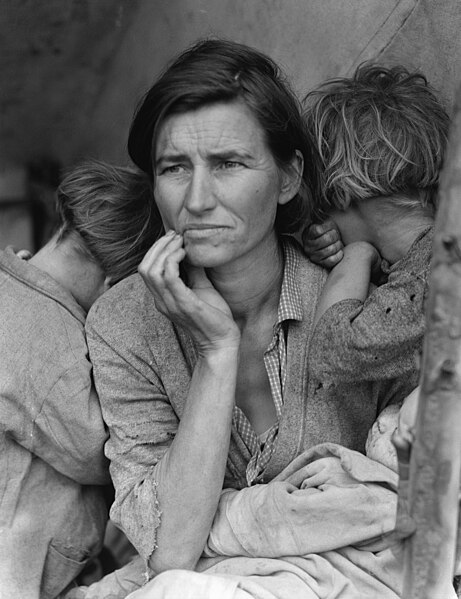 Elizabeth Thomsen began this presentation with an image of Dorothea Lange's striking photograph “Migrant Mother”. Elizabeth showed how, while the image became an icon of reform during the Great Depression (influencing Steinbeck to write The Grapes of Wrath, among other effects), representations such as this can be deceiving: when asked about her impressions of the image, the photo's subject claimed that she was entirely misrepresented and wished that Lange had never taken her picture. Thus we have an example of both the powers of and the negative possibilities of photography.
Elizabeth Thomsen began this presentation with an image of Dorothea Lange's striking photograph “Migrant Mother”. Elizabeth showed how, while the image became an icon of reform during the Great Depression (influencing Steinbeck to write The Grapes of Wrath, among other effects), representations such as this can be deceiving: when asked about her impressions of the image, the photo's subject claimed that she was entirely misrepresented and wished that Lange had never taken her picture. Thus we have an example of both the powers of and the negative possibilities of photography.Elizabeth next showed a virtually unknown photograph by Lewis Hine, “Spinning Room Boys, Salem, MA”. She explained that the majority of Hine's published photos are drawn from a small pool of famous images while photos such as these were rarely seen before the advent of the web. Upon seeing the photo in an online archive, she was surprised to find that one of the boys in the image was the grandfather of her boss.
She then contrasted the experiences of the boys in the Hine photo (circa 1910), who were probably only ever represented photographically in this photo, with those of children today, who are seemingly inundated with photographic equipment. As technology becomes more affordable and more powerful the number of photographs in our lives expands exponentially, leading to what Elizabeth referred to as “The Age of the Ubiquitous Photograph”.
Surrounding by all of these mass amounts of digital images, what are our libraries to do with them? Elizabeth focused primarily on online photosharing sites, such as Flickr, as means of archiving and assembling digital photos and in turn using these archives as a means to promote our librariies to the general public.
She extensively covered the various points of contention that surround Flickr, such as copyright, permissions, and contact linkage, assessing each of these factors and relating how a library could properly handle these issues. She urged the audience to keep our images as Creative Commons images, thus allowing the public to use them freely for non-commercial purposes, which in turn supports a thriving online community of royalty-free images. Along with this came concerns about photographing people, mainly related to the idea of whether or not a library is indeed considered a “public” place. She suggested that we make attempts to get permission from people appearing in our photos, as well as trying to shoot creatively to avoid distinct images of people.
She then showed ways in which digital images can be integrated into online maps, though Flickr and Google Maps, as a way of creating easily navigable multimedia tools. She showed us a Google Map of her own creation in which Massachusetts diners are represented on the map, complete with images and information about each diner.
Elizabeth's Blogs:
Professional
Personal



1 comment:
Thanks for doing this detailed summary!
I posted the presentation on Slideshare:
Building Community Through Photography
And here's a link to Joe Manning's site:
Mornings on Maple Street where you can read more about his experiences tracking down the life stories and descendants of some of the children photographed by Lewis Hine, and other interesting projects. He lives in Florence, Massachusetts (a village of Northampton) and he speaks about his work at schools, libraries, conferences, etc.
Post a Comment